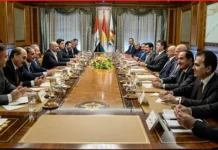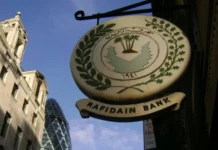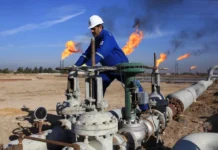Al-Mandlawi: The United Nations Is A Key Partner In Building The New Iraq.
Friday, September 5, 2025, 18:38 | Politics Number of readings: 77 Baghdad / NINA / The First Deputy Speaker of Parliament, Mohsen Al-Mandalawi, stressed that the legislative authority’s firm position is that the United Nations is a key partner in building the new Iraq, praising the mission’s effective contributions over the past two decades in the areas of reform and support for national institutions.
His media office stated that “the First Deputy Speaker of Parliament, Mohsen Al-Mandalawi, received today, Friday, the Special Representative of the Secretary-General of the United Nations in Iraq and Head of the UNAMI Mission, Mohammed Al-Hassan.”
During the meeting, the latest developments on the local and regional arenas were discussed, as well as the role of the international organization in supporting Iraq’s stability and promoting political and economic development paths, especially in light of the transitional phase that the United Nations Mission in Iraq is going through.
The First Deputy Speaker of Parliament called on the United Nations to “assume its humanitarian and moral role in stopping the mass killings and starvation war practiced by the usurping Zionist entity against the people of Gaza, stressing that the continuation of these crimes before the eyes of the world without taking a clear official position represents a blatant violation of all international conventions and principles of human justice.”
For his part, Mohammed Al-Hassan expressed his appreciation for the ongoing cooperation with the Iraqi authorities, affirming the international organization’s commitment to continuing to support Iraq in its reform and development paths.
He pointed to the importance of continuing the partnership between Iraq and the United Nations in a way that enhances regional stability and serves the interests of the region’s peoples. https://ninanews.com/Website/News/Details?key=1250174
Iraqi Oil Prices Decline On The Global Market To Around $65.19 Per Barrel.
Economy | 05/09/2025 Mawazine News – Baghdad – Iraqi oil prices declined on Friday during daily trading in the global market.
According to data, Basra Heavy crude recorded $65.19 per barrel, while the average recorded $68.39 per barrel, with a change of -1.92 for both.
In contrast, the data showed a decline in global crude prices, as British Brent crude recorded $66.89 per barrel, while US West Texas Intermediate crude recorded $63.34 per barrel, with a change of -0.11 and -0.14, respectively. https://www.mawazin.net/Details.aspx?jimare=266259
Iraq’s Oil Exports Rose By 75,000 Barrels Per Day In August.
Buratha News Agency 102 2025-09-05 Iraq’s crude oil exports rose by 75,000 barrels per day (bpd) in August, on a monthly basis, marking the third consecutive monthly increase.
Data from the Washington-based Energy Research Unit shows that Iraqi seaborne oil exports rose to 3.457 million barrels per day in August 2025, compared to 3.382 million barrels per day in the previous July.
On an annual basis, Iraqi crude oil exports also increased by more than 63,000 barrels per day, compared to the same month’s export rate of 3.394 million barrels per day last year.
Despite the increase over the past three months, Iraq’s average seaborne crude oil exports fell to 3.34 million barrels per day (bpd) from January to the end of August 2025, compared to 3.45 million bpd during the same period last year.
Iraq’s monthly oil export performance
Iraq’s seaborne crude oil exports in August reached their second-highest level since the beginning of the year, according to the following figures:
January: 3.299 million barrels per day.
February: 3.485 million barrels per day.
March: 3.280 million barrels per day.
April: 3.319 million barrels per day.
May: 3.207 million barrels per day.
June: 3.331 million barrels per day.
July: 3.382 million barrels per day.
August: 3.457 million barrels per day.
The above figures show that Iraq’s crude oil exports in August recorded the second-highest year-on-year increase since the beginning of the year, exceeding 63,000 barrels per day, compared to the same month’s export rate last year of 3.394 million barrels per day.
Iraq’s seaborne oil exports increased by 132,000 barrels per day (bpd) year-on-year in February, the highest rate of increase since the beginning of the year, compared to the 3.354 million bpd exported in the corresponding month last year.
While May recorded the highest annual decline since the beginning of the year, reaching 357,000 barrels per day, compared to the same month’s exports last year, which amounted to 3.563 million barrels per day.
Iraq’s oil exports until August 2025
It’s worth noting that eight OPEC+ countries, including Iraq, have decided to reinstate the voluntary production cuts of 2.2 million barrels per day (bpd) to the market since last April. The production ceiling will be gradually raised to 547,000 bpd by September 2025, when the cuts will be phased out.
The largest importers of Iraqi oil
Led by China, Asian countries continued to receive the majority of Iraq’s seaborne crude oil exports during August, as follows:
China: 1.43 million barrels per day.
India: 958,000 barrels per day.
South Korea: 226,000 barrels per day.
China’s imports of Iraqi oil jumped by 331,000 barrels per day in August, compared to the previous month’s export rate of 1.099 million barrels per day.
India’s imports of Iraqi crude oil also rose last month by more than 209,000 barrels per day (bpd), compared to July’s 749,000 bpd.
In the same context, Baghdad exported 271,000 barrels of oil per day in August of unknown destinations, with most of this estimated to go to Beijing, following updated data.
In contrast, Iraq’s oil exports to South Korea declined by 219,000 barrels per day in August, compared to the previous month’s exports of 445,000 barrels per day.
US imports of Iraqi oil jumped last month to 159,000 barrels per day, compared to more than 96,000 in July, an increase of 63,000 barrels per day. https://burathanews.com/arabic/economic/464689
Suspicions Of Import From The UAE… Economist Calls For Gold Automation In Iraq
Economy | 05/09/2025 Mawazine News – Baghdad – Economic expert, Manar Al-Obaidi, revealed on Friday suspicions of gold imports from the United Arab Emirates, calling for the complete automation of the gold sector in all its stages.
Al-Obaidi said in a post on his Facebook account, followed by Mawazine News, that “official data issued by the UAE Statistics Authority indicate that the volume of UAE exports to Iraq amounted to approximately $33 billion in 2024, distributed as follows: $12.8 billion in precious metals, mostly gold; $6.3 billion in electronic devices, the largest portion of which is mobile phones; $5.1 billion in cars; in addition to $2.3 billion in electrical and mechanical devices.”
He added, “In comparison, the UAE’s exports to Iraq in 2023 did not exceed $23 billion, of which gold accounted for only $3.2 billion.” Explaining that “this significant increase in gold imports during 2024 raises legitimate questions, especially considering that one of the most important reasons is the use of gold as an alternative tool for financial settlements in trade with some countries, in addition to its ease of liquidity in markets and its use in various financial transactions.”
Al-Obaidi asked, “Where were these massive gold imports financed? Were they fully covered by transfers from the Central Bank of Iraq?” He explained that “if this is the case, it is despite the regulatory system implemented since 2023, which limited the ability of dozens of Iraqi banks to conduct external transfers and focused monitoring on the remaining banks, thus requiring stricter monitoring of trade finance operations.”
The economic expert said, “If the purchase of gold was financed outside the Iraqi banking system, then what is the source of this money and why was it used to purchase gold and export it to Iraq?”
He pointed out that “data for the first quarter of 2025 indeed indicates a sharp decline in UAE gold exports to Iraq by 52% compared to the same period the previous year. However, the reasons for the significant jump in 2024 and subsequent decline in 2025 remain unclear, which calls for a serious pause.
The fact that more than 12% of Iraq’s total imports go to cover gold imports requires careful monitoring, starting with identifying the sources of financing for this commodity, through its transport channels and the ports through which it entered the country, and ending with the identities of importers and the uses of this gold.
” The economic expert stressed the “need for economic policies to move towards fully automating the gold sector in all its stages, and to prohibit transactions except through monitored electronic payment channels, which allows tracking of sales and purchases and identifying the ultimate beneficiary of these large quantities.
The goal is not only to meet Iraq’s actual need for gold, but also to prevent its use for purposes that could harm the national economy and undermine confidence in the Iraqi banking system.” https://www.mawazin.net/Details.aspx?jimare=266268
For current and reliable Iraqi news please visit: https://www.bondladyscorner.com






